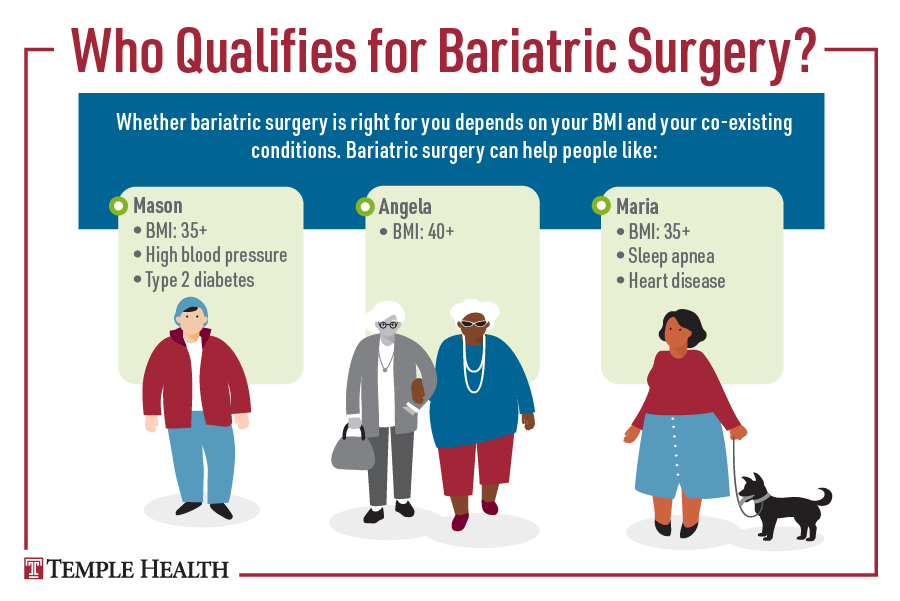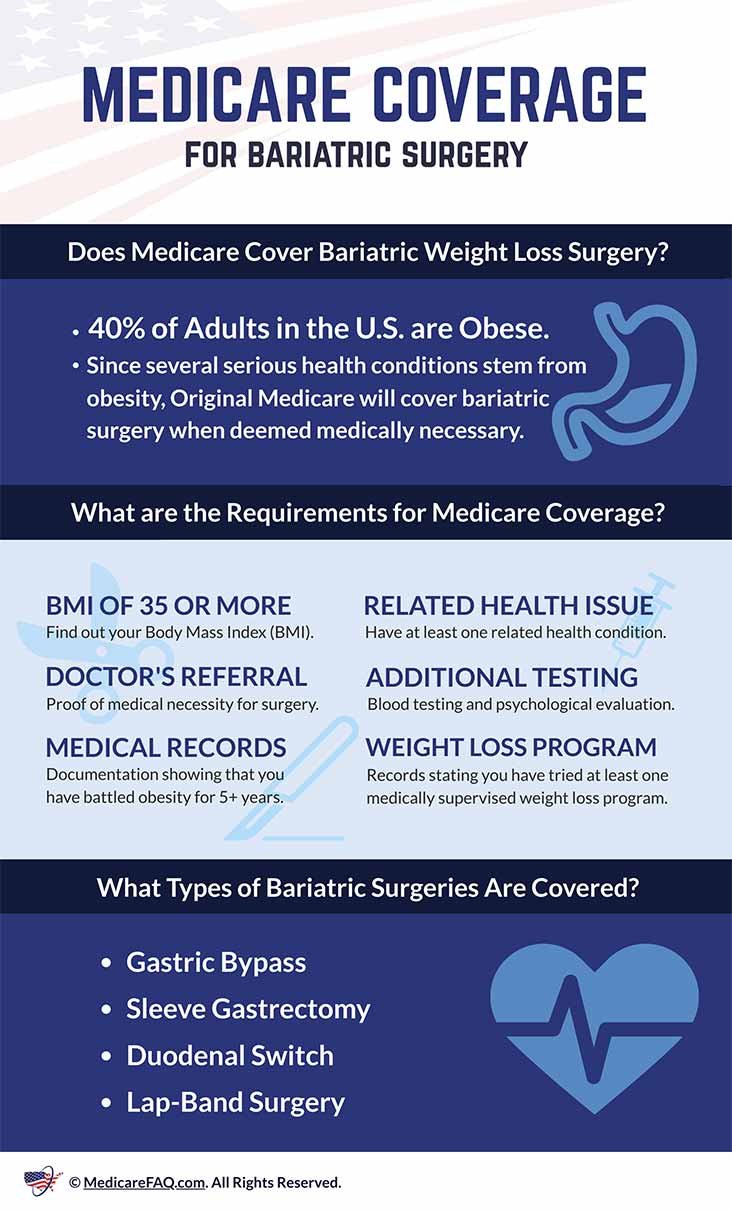To determine if you qualify for weight loss surgery, a BMI of 40 or higher is typically required or a BMI of 35 with obesity-related conditions. Specialist consultation and meeting medical criteria are also essential prerequisites.
Weight loss surgery, often known as bariatric surgery, is a significant step towards a healthier life for those struggling with obesity. Qualifying for this life-altering procedure involves strict medical guidelines and a thorough evaluation of your health history. Prior to considering surgery, individuals usually explore multiple weight loss methods without success.
The candidacy for weight loss surgery revolves around body mass index (BMI) benchmarks and obesity-associated health issues such as diabetes or hypertension. It’s crucial for patients to recognize that surgery is not a standalone solution but part of a comprehensive approach to weight management, requiring long-term commitment to lifestyle changes and follow-up care. Consulting with healthcare professionals can help you understand if weight loss surgery is a viable option for your unique situation.

Credit: www.aslitarcanclinic.com
Introduction To Weight Loss Surgery
Introduction to Weight Loss Surgery:
Many people face challenges in losing weight. For some, diet and exercise might not be enough. Weight loss surgery could be a solution. It helps by making changes to your stomach or digestive system. This can help you eat less and lose weight. Want to know if you qualify for this kind of surgery? Taking a quiz can guide you.
The Role Of Surgery In Weight Management
Weight loss surgery, also called bariatric surgery, plays a key role in weight management for those with obesity. It is not the first choice. Doctors suggest it when other ways like diet and exercise have not worked. This surgery can help lower the risk of health problems related to obesity.
- Improves your ability to do daily activities
- Helps in reducing weight-related health risks
- Limits how much food you can eat
- Changes the body’s food digestion
Common Types Of Weight Loss Procedures
Several types of weight loss surgeries can help you lose weight. Each surgery works in a different way. Some make the stomach smaller, while others change the small intestine.
| Surgery Type | How it Works |
|---|---|
| Gastric Sleeve | Removes part of the stomach, making it smaller. |
| Gastric Bypass | Creates a small stomach pouch and reroutes the intestines. |
| Adjustable Gastric Band | Places a band around the upper part of the stomach to create a small pouch. |
| Biliopancreatic Diversion with Duodenal Switch | Combines stomach removal with intestinal bypass. |
Criteria For Weight Loss Surgery Candidates
Bariatric or weight loss surgery can be a life-changing decision. Understanding the criteria for surgery is crucial. This post helps you learn if you might qualify by delving into BMI requirements, health conditions, and previous weight loss efforts.
Bmi Requirements
Body Mass Index (BMI) plays a key role in qualifying for weight loss surgery. In general:
- A BMI of 40 or higher is necessary for consideration.
- People with a BMI between 35 and 39.9 may also qualify if they have serious health issues.
Associated Health Conditions
Specific health conditions related to obesity can affect eligibility:
| Condition | Relevance to Surgery |
|---|---|
| Diabetes | Can warrant surgery for BMI 35+ |
| Sleep Apnea | Often improves post-surgery |
| High Blood Pressure | May reduce the need for medication |
Prior Weight Loss Efforts
Past attempts to lose weight are essential to the surgery assessment. Candidates usually need to show:
- Consistent efforts to lose weight through diet and exercise.
- Participation in medically supervised weight loss programs, in some cases.
Assessing Your Eligibility
Thinking about weight loss surgery? It can be life-changing. Yet, it’s not for everyone. To see if you qualify, take a detailed look at your health and lifestyle. This quiz will guide you through some key points to consider. Your answers will help decide if surgery is a suitable option for you.
Key Factors To Consider
Weight loss surgery isn’t a one-size-fits-all solution. Certain criteria must be met. Here are the key factors that doctors look at:
- Body Mass Index (BMI): A BMI of 40 or higher is a major factor.
- Health Conditions: Issues like diabetes or heart disease play a part.
- Past Weight Loss Efforts: Surgery is usually a last resort.
- Age and General Health: These may influence surgery outcomes.
- Mental Readiness: Psychological preparedness is crucial.
- Commitment to Change: Surgery requires lifelong lifestyle adjustments.
Self-evaluation Questions
Answer these self-evaluation questions to check your eligibility:
| Question | What It Means for You |
|---|---|
| Is your BMI over 40? | You might meet the basic requirement for surgery. |
| Do you have health problems related to obesity? | If yes, surgery could greatly improve your health. |
| Have diets and exercise failed you before? | Surgery could be the next step if other methods haven’t worked. |
| Are you ready for a lifelong commitment to health? | Surgery success depends on your long-term lifestyle changes. |
| Have you been well informed about the surgery? | Understanding the risks and benefits is key to your decision. |
| Will you follow up with your healthcare provider? | Regular check-ups are essential after surgery. |
Understanding these factors and answering the quiz questions truthfully is your first step to a healthier you. Your healthcare team will use this information to help determine your path forward.
The Quiz: Your First Step
Thinking about weight loss surgery can bring many questions. Knowing if you qualify is your first step. A simple quiz can start your journey. This quiz sheds light on your eligibility. Let’s dive into how this quiz could be a guiding star in your weight loss journey.
Structure Of The Quiz
Our weight loss surgery quiz is straightforward. It consists of a series of questions designed to understand your history and health. These questions cover:
- Basic personal information such as age and gender
- Weight-related health history, including any previous attempts at weight loss
- Current weight and height to calculate Body Mass Index (BMI)
- Lifestyle questions that relate to diet and physical activity
- Medical background, focusing on conditions linked to obesity
Answer honestly for the most accurate results.
Interpreting Your Results
Once you complete the quiz, your results come immediately. They indicate whether you’re a potential candidate for weight loss surgery.
Understanding your results is crucial. Here is what they mean:
| Result Indicator | Meaning |
|---|---|
| Eligible | You meet the requirements for weight loss surgery. |
| Maybe Eligible | Further evaluation is necessary to confirm eligibility. |
| Not Eligible | You currently do not meet the criteria for surgery. |
Regardless of the outcome, the results are a starting point. They are a chance to discuss with your doctor. Together, you can decide on the best path forward for your health.
Psychological Considerations
When thinking about weight loss surgery, it’s not only about your physical health. Your mind plays a huge role in your journey. Understanding the psychological aspects of weight loss surgery is as vital as the procedure itself. Let’s explore mental preparedness and the support systems that are key to a successful outcome.
Mental Readiness For Surgery
Before stepping into the surgery room, being mentally ready is crucial. Surgery is a big step. You must have realistic expectations. It’s not a quick fix. Long-term habits need to change. The journey is tough but worth it. You must be ready to face challenges head on. Ask yourself these:
- Am I ready for a lifelong commitment to health?
- Can I handle the emotional rollercoaster?
- Do I understand the risks and benefits?
Answering these questions will show if you are mentally prepared. It’s not just about wanting to lose weight. It’s about being ready for the new life ahead.
Importance Of A Support System
Your support system is your rock during this time. You need people who stand by your side. Family, friends, or support groups can make all the difference. They help you stay on track. Here are reasons why support matters:
| Support System Role | How They Help |
|---|---|
| Emotional Support | They listen and understand your struggles. |
| Motivation | They remind you of your goals. |
| Accountability | They keep you responsible for your actions. |
Find your tribe. Join online forums. Attend support group meetings. Gather people who uplift you. Their role in your success is priceless.

Credit: www.templehealth.org
Pre-surgery Lifestyle Changes
Before weight loss surgery, certain changes are a must. They set the stage for success. Making the right changes helps with surgery preparation. Surgery is a tool, but lifestyle changes are key.
Diet And Exercise
Understanding your diet and exercise routine is essential. Let’s explore what you need to know:
- Eat smaller portions. Your stomach will hold less food post-surgery.
- Focus on high-protein foods. They help your body heal and maintain muscle.
- Reduce high-sugar and high-fat foods. Less of these means faster progress.
- Water is key. You must stay hydrated but avoid drinking with meals.
- Regular exercise is a habit to start now. Aim for 30 minutes a day.
Necessary Behavior Modifications
Changing behaviors is vital for long-term results. These steps can help:
- Track your eating. Write down everything you eat to notice patterns.
- Know your triggers. Avoid situations that make you want to eat more.
- Plan meals. Planning helps you make healthier choices.
- Support is important. Join groups for people on the same journey.
These changes won’t just prepare you for surgery. They’ll help you for life.
Understanding The Risks And Benefits
Understanding the risks and benefits is crucial for anyone considering weight loss surgery. This decision involves more than just a physical change. It’s a step towards a healthier life. But, it carries its set of possible complications and potential health improvements. A careful assessment can help determine if the surgery’s advantages outweigh the risks for you.
Possible Complications
Weight loss surgeries are major procedures. They come with both short-term and long-term potential complications. Understanding these risks is essential.
- Infection: A common risk following any surgery.
- Bleeding: It can occur during or after the procedure.
- Nutrient deficiencies: The body’s ability to absorb nutrients may change.
- Psychological effects: Changes in lifestyle can affect mental health.
Long-term Health Improvements
On the brighter side, the potential health benefits are significant. Weight loss surgery can lead to profound long-term improvements.
| Health Improvement | Details |
|---|---|
| Diabetes remission | Many patients see a decrease or complete remission of type 2 diabetes. |
| Heart health | Risks for heart conditions are greatly reduced. |
| Joint pain | Weight reduction relieves pressure on joints, easing pain. |
| Improved fertility | Women may experience improved fertility post-surgery. |

Credit: www.clinicexpert.com
Next Steps After The Quiz
Embarking on a weight loss journey can be daunting. Post-Quiz action is crucial. Your quiz results suggest you may be a candidate for weight loss surgery. What should you do next? A clear plan helps you move forward with confidence.
Consulting With A Surgeon
Your first actual step is to discuss your options with a professional. Seeking advice from a qualified bariatric surgeon is vital. They will review your quiz results. Then, they will talk about the risks and benefits of surgery.
- Bring your quiz results
- Prepare questions in advance
- Discuss surgery types
- Talk about your health history
- Consider insurance coverage
Preparing For Pre-operative Evaluations
Following your surgeon consult, evaluations begin. These assessments are crucial. They ensure you’re ready for surgery. Tests will check your physical and mental health status.
| Pre-Op Evaluation | Purpose |
|---|---|
| Physical Exam | Assess overall health |
| Laboratory Tests | Check blood and other vitals |
| Nutritional Counseling | Prepare for diet changes |
| Psychological Evaluation | Gauge mental readiness |
Be sure to attend all appointments. Gather all necessary information. These steps are essential to your well-being.
Insurance And Financial Planning
Exploring weight loss surgery options can be overwhelming. It’s vital to consider the role of insurance and financial planning.
Coverage Criteria
Insurance companies have specific rules for weight loss surgery coverage. Key points consider:
- Body Mass Index (BMI): A BMI of 40 or higher often qualifies.
- Medical Conditions: Diabetes or heart disease may necessitate surgery.
- Prior Weight Loss Efforts: Evidence of unsuccessful weight management may be required.
Contact your insurer for detailed eligibility criteria. They provide necessary forms and guidelines.
Out-of-pocket Costs
Even with coverage, you may face additional expenses. Consider:
| Type of Cost | Details |
|---|---|
| Deductibles | Amount paid before insurance kicks in |
| Co-payments | Fixed fee for each doctor’s visit or prescription |
| Co-insurance | Percentage of the total cost you pay post-deductible |
Plan for these costs. Budgeting helps manage them without surprise. Financial advisors offer assistance in planning.
Long-term Success Strategies
After taking the “Do I Qualify for Weight Loss Surgery Quiz”, think about strategies for the long haul. A successful outcome depends on more than just surgery. It involves overall lifestyle changes and consistent medical check-ups. Embrace these strategies for the best results.
Post-surgery Lifestyle
Adjusting your daily habits is key to maintaining weight loss post-surgery. Focus on these elements:
- Nutritious Diet: Eat whole foods. Avoid sugary snacks and drinks.
- Exercise Routine: Find an activity you enjoy. Make it a regular part of your week.
- Support Networks: Join groups or online communities. Share your journey and get tips.
- Behavioral Changes: Learn about your eating patterns. Work on mindfulness.
Continual Medical Supervision
Maintaining contact with healthcare professionals ensures long-term success:
- Regular check-ups with your surgeon or bariatric team are vital. They track your progress and help you stay on target.
- Nutritional counselling may be necessary. A dietitian can tailor your eating plan, ensuring you get the nutrients you need.
- Psychological support can be beneficial. Talk with a therapist about any emotional challenges linked to weight and eating.
These strategies are not just suggestions. They are crucial steps in your weight loss journey. Treat them as important as the surgery itself for a healthier, happier life.
Frequently Asked Questions
How Do I Know If I Qualify For Weight Loss Surgery?
To determine eligibility for weight loss surgery, consult with a healthcare professional. Generally, criteria include having a BMI over 40, or over 35 with obesity-related health conditions.
Is It Hard To Get Approved For Weight Loss Surgery?
Getting approved for weight loss surgery can be challenging, as it requires meeting specific medical criteria and often involves a thorough evaluation process including assessments by dietitians, psychologists, and surgeons.
What Would Disqualify You From Weight Loss Surgery?
Certain health conditions, lack of commitment to lifestyle changes, and inadequate psychological readiness can disqualify someone from weight loss surgery. Non-compliance with pre-surgery evaluations or substance abuse issues may also lead to disqualification.
How Much Weight Do You Need To Lose To Qualify For Weight Loss Surgery?
To qualify for weight loss surgery, you generally need a BMI of 40 or higher. Alternatively, a BMI of 35 or more with obesity-related health conditions may also make you eligible.
Conclusion
Deciding on weight loss surgery is a significant health choice. Our quiz serves as a starting point in this journey. Should you meet the criteria, consult a healthcare specialist to explore your options. Embracing this change can pave the path to a healthier, more vibrant you.
Always remember, assessing your eligibility is just the beginning!







